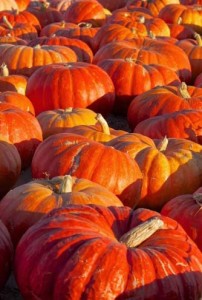
More evidence that low-calorie sweeteners are bad for your health
Studies show that artificial sweeteners can raise the risk of hypertension, metabolic syndrome, type 2 diabetes and heart disease, including stroke.

Of all the squashes the pumpkin is arguably the most iconic poster child for autumn.
Pumpkins are a variety of winter squash. They are high in fibre and also have a sweeter taste than many other squashes – and they make wonderful seasonal lanterns for harvest festivals and for Halloween.
Winter squash comes in many different colours, sizes and shapes. Their bright orange flesh is a clue to their nutritional benefits. All are good sources of antioxidant flavonoids such as beta carotene, which is responsible for its vibrant colour.
In addition, the flesh and seeds are a good source of healthy fatty acids. Compared to watery ‘summer’ squashes like courgettes and marrows, these more substantial and vibrant ‘winter’ varieties are so-called because their usually thick, tough rinds mean they store well through the colder months.
Including more squashes in your regular diet is a very healthy thing to do and pumpkins and squashes have a long history as medicinal foods. And with good reason. For example, around half of the carbohydrate in winter squashes is in the form of polysaccharides (including pectin). This makes them anti-inflammatory, antioxidant as well as having insulin-regulating properties.
In addition they are:
Good for your heart. The wide range of nutrients in squases, such as alpha and beta carotene, vitamin C, manganese and magnesium, are all heart healthy. In particular they help protect against stroke and normalise blood pressure. The folate in them neutralises dangerous homocysteine – a risk factor for heart disease. Pumpkin seed oil has also been shown to help lower cholesterol.
Good for your gut. Squashes are high in fibre. Increased dietary fibre supports a healthy bowel by promoting regularity. The fibre, along with other components in squashes can also help regulate blood sugar levels.
Good when you are pregnant. Squashes contain large amounts folic acid. This makes them a good choice during pregnancy. While folate deficiency isn’t the sole cause of birth defects adequate levels are a factor in preventing neural tube defects.
Good if you are a man. Pumpkins, and in particular pumpkin seed oil, contain plant hormones that can help combat prostate enlargement
Squash is also the ultimate look good and feel good food. Both the flesh and the seeds contain beta carotene to promote healthy eyes and a health immune system, and magnesium which is vital for maintaining the bones and teeth. The vibrant flesh also contains small amounts of tryptophan which can elevate mood and aid restful sleep.
Try different varieties
The large pumpkins we use to make seasonal lanterns are edible, but they may not have the best flavour because they’re grown for size not taste. Also never eat them after they have had a candle burning in them as the flesh will have absorbed any toxins present in the burning wick and wax.
Instead, try other smaller varieties which have a more intense flavour and are well worth experimenting with. Some like Acorn squash have thick rinds and a firm texture. Others like Butternut squash have rinds that are thin enough to eat once they are cooked. When you can eat the skin do, because many important nutrients concentrate there.
Remember also to by organic. Squashes have a tendency to absorb heavy metals and other toxins from the soil they grow in. Thus it is especially important to ensure they are grown in good soil using non-toxic methods.
One of the simplest ways to enjoy squash just to roast it. Cut any type of squash into chunks; the skin can be left on thin skinned varieties. Toss in olive oil and season with cinnamon and a generous amount of fresh thyme. Place on a baking tray in a moderate oven and bake for 30-40 minutes.
Keep the seeds
When you are scooping out the middle of your pumpkin or any other squash don’t throw away the seeds. All squash seeds (not just pumpkin seeds) are edible and are good sources of healthy fats, protein and fibre. Squash seeds have a long been used in traditional medicine for prostate and urinary problems, and their high-fat, low-carbohydrate content can be useful for heart health.
To roast the seeds, rinse them and remove any bits of stringy fibre. Place on a baking tray and bake on a low heat for 15 minutes. Keeping the heat low preserves beneficial fatty acids.
Or if you are roasting your squash simply toss the seeds in the roasting pan with the flesh and enjoy. If you’d like to try your hand at a Warming Pumpkin Soup, check out our recipe here.

Please subscribe me to your newsletter mailing list. I have read the
privacy statement